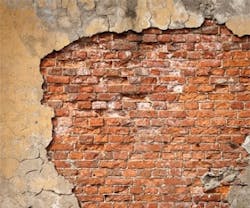In February 2010, Philadelphia joined the list of cities with facade ordinances requiring periodic inspections of buildings that meet specified requirements. These ordinances are in place to protect the public, and in turn protect you from the potential legal ramifications associated with property damage or personal injury, due to your buildings faulty facade.
According to facadeordinance.com, an informational site maintained by Wiss, Janney, Elstner Associates, Inc., the cities of Boston, Chicago, Columbus, Detroit, Milwaukee, New York, Philadelphia, Pittsburgh, and St. Louis are among the cities that currently have an ordinance.
Philadelphia
Philadelphia’s ordinance — PM-304.10 - Periodic Inspection of Exterior Walls and Appurtenances of Buildings, part of Chapter 3 - General Property and Structural Maintenance Code of the Philadelphia Building Construction and Occupancy Code — is applicable to all buildings six or more stories in height, all buildings with any appurtenance in excess of 60 feet in height, and any building (aside from one- or two-family dwellings) greater than two stories located in specific areas that are yet to be determined.
A Commonwealth of Pennsylvania licensed Professional Engineer who is experienced in the practice of structural engineering or a licensed Registered Architect who is knowledgeable in the design, construction, and inspection of building facades is to conduct and witness or supervise the inspection. The inspection should be physical and hands-on and performed from a scaffold or other observation platform at a representative sample of the exterior wall, determined by the professional. The professional determines the methods employed in the inspection, based upon the known history of the building, the nature of the materials used, and the conditions observed. However, the professional does not need to be physically present at the location where the inspection is made.
Violations of the ordinance are considered to be a Class III offense, which is a $2000 fine under 1-109 of the Philadelphia Code.
Chicago
Chicago enacted its facade ordinance in 1996, with major revisions following in 2000 and 2007. The rules and regulations that supplement the ordinance were last revised in October 2009. All building enclosures and exterior walls that are 80 feet or more in height are subject to the code.
Illinois licensed architects and structural engineers or personnel under their direct supervision are allowed to perform inspections. Hands-on, close-up inspection is to be performed where required for critical examination. For on-going inspections, visual surveys from afar are allowed, unless a professional recommends close-up inspections. Depending on material and building age, a substrate inspection may also be required.
Fines for non-compliance range from $1,000 per day to $2,500 per day.
New York City
New York City enacted a facade ordinance in 1980 and revised it in 1998. The code requires all buildings at or greater than six-stories with a basement be inspected by an architect or structural engineer, or personnel under their direct supervision once every five years. The inspection consists of a visual survey plus one sample representative scaffold drop for hands-on inspection.
Fines for non-compliance can be $1,000 and/or imprisonment for no more than six months plus $250/month for non-compliance.
Due to the consequences and costs of facade-related accidents, ordinances governing inspection practices are getting stricter. Take a look at your city’s code (or visit www.facadeordinance.com) to confirm you are up to code, ensuring you won’t be subject to non-compliance fines – or worse.
Kylie Wroblaski ([email protected]) is associate editor of BUILDINGS.
()
()
